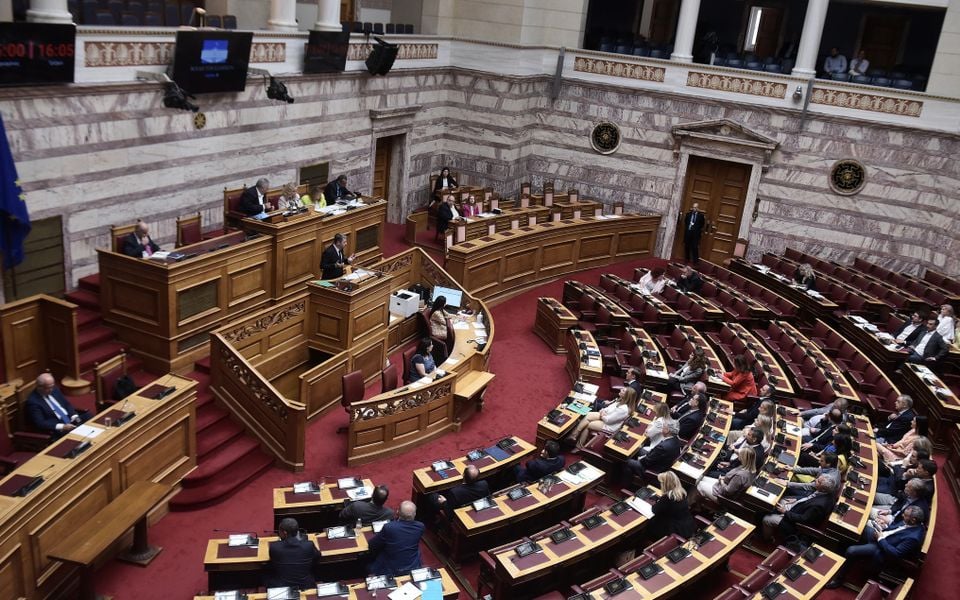
Parliament is seen during a debate on whether to investigate two former agriculture ministers, based on the findings of the European Public Prosecutor’s Office of large-scale fraud in the OPEKEPE subsidies agency. [InTime News]
In a country where soccer (and perhaps basketball) referees must be foreigners in order for the championship to end smoothly, the charm exercised by the European Public Prosecutor’s Office (EPPO) surprises no one. Like other tragic heroes, we await catharsis from an exotic deity based in Luxembourg, which has been around for less than five years. But what is it that makes it so attractive? Are its alleged advantages compared to the undeniable dysfunctions of the domestic judicial system enough to explain it? Or is something more needed, that pervasive nihilism toward everything we produce, which makes anything imported incomparably better in our eyes?
In Greece, we are not interested in the big European picture. We shrink it into our own microcosm
The legal basis for the European Public Prosecutor’s Office was adopted in 2017 (and started operating in 2021). It investigates crimes against the financial interests of the European Union, which is no coincidence. In recent years, the vision of European unification has been advancing not by constitutional leaps and political innovations, but by public funding tools, such as the colossal Recovery and Resilience Facility (RRF). As EU funds increase, the risks of their waste increase as well, providing arguments for Euroskeptics. The EPPO has more power than other judicial institutions. It does not deal with the nuances of fundamental rights or interpretations of EU law, like the European Courts in Strasbourg and Luxembourg. It investigates real situations of fraud or corruption; it may send the accused to prison through national criminal courts. That’s why its establishment was so delayed.
In Greece, we are not interested in the big European picture. We shrink it into our own microcosm, depending on which side each person stands on: The EPPO is either an annoying hangnail of those dumb Europeans that undermines the successful national narrative, or a cavalry of the EU that will expose the stench of those in power. Except that the EPPO is neither. It constitutes an additional institution for the preservation of the rule of law; its disconnection from national legal orders generates advantages as well as disadvantages. Its EU status and its multinational identity protect it from the pressure of domestic centers of power. At the same time, it presents the classic EU weaknesses: It has a central head, but its body and limbs in the member-states are atrophied, since the EU never evolved into a normal federation. It has, however, an important motivation. Its acceptance by the European peoples depends on the independence and quality of its work.
This, I think, is the deepest source of the fascination that the EPPO has for us. It puts forward two characteristics that – rightly or wrongly – we believe that the Greek criminal justice system has somewhat lost: impartiality and performance, not in words, but with evidence. In my opinion, the problem lies not so much at the top – where those who politicize crimes focus – but in the daily functioning of the justice system.
The petty swindlers of OPEKEPE – the organization in charge of distributing EU farm funds in Greece – on Crete were acquitted or not prosecuted, without the need for any political pressure, simply because it is not easy to convict someone on Crete. The EPPO is far from all this, and is still too fresh to have disappointed anyone. And so, in any case, its contribution is valuable. I do not mean the petty political exploitation, which works both ways. If highlighting scandals benefits the opposition, archiving cases offers the government the presumption of legitimacy.
I consider the institutional example more important. The prosecutorial procedures of the EPPO create a greater sense of security and justice among the public. A sense that is as equally necessary as the quality of the judicial officers, who ultimately come from the same pool.
Let us not forget that the investigation of Greek cases on behalf of the EPPO is mainly entrusted to Greek prosecutors who serve in it and will end up before the Greek courts. So we do not lack trust in individuals, but in our own institutions – up to a point, because improvements are indeed needed, and cannot be swept under the rug. And because anything foreign seems better to us. Would Greek referees whistle more correctly if they were appointed directly by UEFA?
George Dellis is a professor at Athens University’s School of Law.